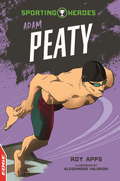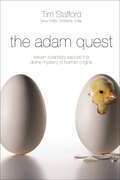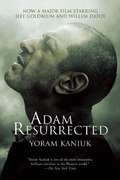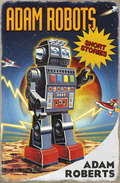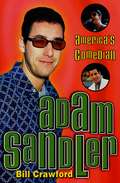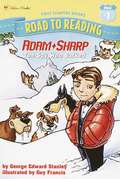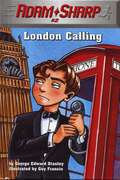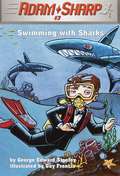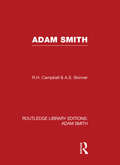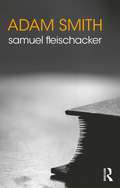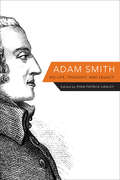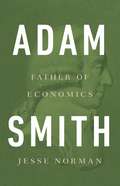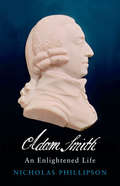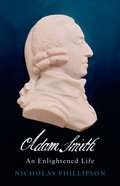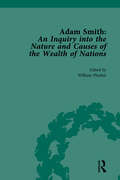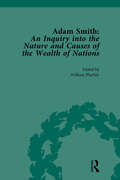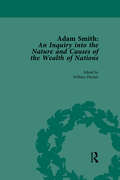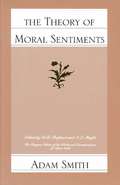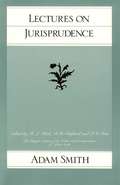- Table View
- List View
Adam of the Road (Newbery Library, Puffin Ser.)
by Elizabeth Gray Robert LawsonNIMAC-sourced textbook
Adam Peaty (EDGE: Sporting Heroes #6)
by Roy AppsThis inspirational biography for children, written by award-winning author Roy Apps, follows the swimming story of Adam Peaty and his incredible rise to become a Commonwealth gold medalist and world-record holder for 100 metre breaststroke. Illustrated with colour artwork by Alessandro Valdrighi, including graphic novel-style panels, this book is perfect for sport-mad girls and boys with a reading age of 7, but will work perfectly well for older readers too. Printed on off-white paper using a reading font approved by the British Dyslexia Association, the Sporting Heroes series brings to life the skill, grit and determination needed to be a world-class sportsperson today. This title is published by Franklin Watts EDGE, which produces a range of booksto get children reading with confidence. EDGE - for books kids can't put down.
The Adam Quest: Eleven Scientists Explore the Divine Mystery of Human Origins
by Tim StaffordScience and faith should be allies, not opponents, in the search for truth.But when it comes to understanding the very beginnings of life, it is no easy task to reconcile the history taught in the Bible with the discoveries of the scientific community.Author Tim Stafford watched the tension between the beliefs of Darwin and the teaching of Genesis shake the faith of his family, ruin friendships, and leave Christians in the field of science feeling as though the doors of the church were closed to their profession.He believes this civil war can stop. The scientific record and the truth of the Bible aren&’t mutually exclusive. The Adam Quest offers a compelling new look at the beginnings of life as Stafford puts questions of dinosaurs, genealogy, and the age of the earth to eleven world-class scientists.A sweeping book—touching everything from advances in genetics to a particle physicist striving to become Anglican priest—Stafford uses the stories and journeys of these remarkable men and women to provide a new diversity of answers. Scientific progress is carefully detailed, while the struggle toward truth and toward God is humanized.A deeply informative look at Christians working in science, this book is for both believers and those who harbor doubts—an intersection of faith and science, and a safe place for questions. Whether you believe in a young earth, intelligent design, evolutionary creationism, or something else, The Adam Quest offers a chance to strengthen your faith, deepen your knowledge, and bring science back into the church.Praise for The Adam Quest&“To a debate that usually provokes accusations, name-calling, and polarization, Tim Stafford offers a wise, mediating overview. For some, this book may well be a faith-saver.&”—Philip Yancey, author of What Good Is God?&“If you&’ve ever been troubled by the relationship between science, the Bible, and human origins—this book is for you. Tim is thoughtful of mind and generous of spirit—two qualities much needed in this discussion.&”—John Ortberg, Senior Pastor of Menlo Park Presbyterian Church, and author of Who Is This Man?&“Tim Stafford provides a glimpse into the lives of eleven scientists with a strong commitment to Christian faith who are involved in the creation/evolution controversies, representing different perspectives. He goes beyond the technical details of the debates to reveal the personal experiences that underlie each of their convictions. Everyone interested in science and faith would benefit from this insightful perspective of the human sentiment behind the wide range of positions.&”—Randy Isaac, Executive Director, American Scientific Affiliation&“The importance of Stafford&’s book is that it brings together the top advocates of the various creation positions and lets them speak for themselves. The personal stories put a human face on a debate that has split Christians from Christians, as well as Christians from non-Christians. I found the discussion of the personal histories of each author as important as the technical positions they defend. This is as much a book about the sociology of science as the details of creation. It lays out how science advances, how Christians practice their faith in their discipline, and how the science establishment responds to propositions that are not in the mainstream.&”—Robert K. Prud'homme, Professor of Chemical and Biological Engineering; Director, Program in Engineering Biology at Princeton University
Adam Resurrected
by Yoram Kaniuk Seymour SimckesAdam Stein, a former circus clown who was spared the gas chamber so that he might entertain thousands of other Jews as they marched to their deaths, is now the ringleader at an asylum in the Negev desert populated solely by Holocaust survivors. Alternately more brilliant than the doctors and more insane than any of the patients, Adam struggles wildly to make sense of a world in which the line has been irreversibly blurred between sanity and madness. --BOOK JACKET. Title Summary field provided by Blackwell North America, Inc. All Rights Reserved
Adam Robots: Short Stories
by Adam RobertsGathered together for the first time from a major publisher - a collection of short stories by Adam Roberts. Unique twisted visions from the edges and the centre of the SF genres. Stories that carry Adam Roberts' trademark elegance of style and restless enquiry of the genre he loves so much.Acclaimed stories, some that have appeared in magazines, some in anthologies, some appearing for the first time.Stories to make you think, to make you laugh, to make you wonder, to make you uneasy. Stories that ask questions, stories that sow mysteries. But always stories that entertain.
Adam Robots: Short Stories
by Adam RobertsGathered together for the first time from a major publisher - a collection of short stories by Adam Roberts. Unique twisted visions from the edges and the centre of the SF genres. Stories that carry Adam Roberts' trademark elegance of style and restless enquiry of the genre he loves so much.Acclaimed stories, some that have appeared in magazines, some in anthologies, some appearing for the first time.Stories to make you think, to make you laugh, to make you wonder, to make you uneasy. Stories that ask questions, stories that sow mysteries. But always stories that entertain.
Adam Sandler
by Bill CrawfordFrom the comedy clubs of New York to his big break on "Saturday Night Live" to block-buster films like "Big Daddy" and "Little Nicky" Adam Sandler has left America howling in their seats and peeing in their pants. Sandler has emerged as the decade's most unstoppable comedic-and the ladies love him! But how many people know the story behind this lovable comedic prodigy's ascent to fame? Bill Crawford takes you back to Sandler's childhood in a small New Hampshire Town, where his stand-up routines were always hits with his classmates but not necessarily the teachers! When Adam left his small town to take on the big city at New York University, it wasn't always easy, Sandler performed as a street musician crooning Springsteen songs to commuters, but he was destined to succeed. From his long friendship with then college classmate Tim Herlihy, who went on to co-write all Sandler's movies, to being discovered by Dennis Miller and eventually becoming America's funnyman, Bill Crawford looks behind the headlines and tabloid tales to shed new light on this decade's comedic darling.
Adam Sharp #1: The Spy Who Barked (Adam Sharp #1)
by George Edward StanleyEight-year-old spy Adam Sharp pursues the very short Ambassador of Barkastan, who has stolen a top secret computer program, DOGBARK, that will let him understand the language of dogs.
Adam Sharp #2: London Calling (Adam Sharp #2)
by George Edward Stanley Guy FrancisBig Ben has been stolen! Only IM--8's top agent Adam Sharp can crack this case. But when Adam gets to London he finds cowgirls square-dancing in Buckingham Palace and cowboys having a hoedown at the Houses of Parliament. Has England gone hog-wild?
Adam Sharp #3: Swimming with Sharks (Adam Sharp #3)
by George Edward Stanley Guy FrancisSomething is sinking the world's ships! Eight-year-old super spy Adam Sharp dives right in to figure out what's going on. But he never expected to see huge robot sharks biting holes in the bottom of the ships. And he certainly never expected to see the words "MADE IN BERMUDA" on the sharks' metal bellies!From the Trade Paperback edition.
Adam Sharp #4: Operation Spy School
by George E. StanleyIt's reading, writing, and reconnaissance for Adam Sharp and the other IM-8 agents when they go back to spy school. But even the hallowed halls of learning aren't safe from evil. Someone is leaking IM-8 secrets! Could there be a spy at spy school? Only Adam Sharp can find out!
Adam Sharp #4: Operation Spy School (Adam Sharp #4)
by George Edward Stanley Guy FrancisIt's reading, writing, and reconnaissance for Adam Sharp and the other IM-8 agents when they go back to spy school. But even the hallowed halls of learning aren't safe from evil. Someone is leaking IM-8 secrets! Could there be a spy at spy school? Only Adam Sharp can find out!
Adam Sharp #5: Moose Master
by George E. StanleyTimber! It's off with the tuxedo and on with a red jacket when Adam Sharp goes undercover as a Mountie in Canada's north woods. Ecanem, a mysterious logging company, is hogging Canada's lumber business, so the Mounties call on superspy Adam Sharp to get to the bottom of things. Will this wanabee Mountie get his man - or, in this case, will he only get a moose?
Adam Sharp #5: Moose Master (Adam Sharp #5)
by George Edward Stanley Guy FrancisTimber! It's off with the tuxedo and on with a red jacket when Adam Sharp goes undercover as a Mountie in Canada's north woods. Ecanem, a mysterious logging company, is hogging Canada's lumber business, so the Mounties call on superspy Adam Sharp to get to the bottom of things. Will this wanabee Mountie get his man--or, in this case, will he only get a moose?
Adam Smith (Routledge Library Editions: Adam Smith)
by R. H. Campbell A. S. SkinnerThis reissued biography of Adam Smith, first published in 1982, presents both an intellectual and personal portrait of the man. It is not intended as a full-scale scholarly biography burdened with heavy footnotes. Although written by two of the world's foremost authorities on Adam Smith, the book is intended as an accessible study of a great thinker and philosopher which will help to introduce the reader to both his ideas and his period.
Adam Smith: The Adam Smith Review, Volume 5: Essays Commemorating The 250th Anniversary Of The Theory Of Moral Sentiments (The Routledge Philosophers #5)
by Samuel FleischackerAdam Smith (1723–1790) is widely regarded as one of the great thinkers of the Enlightenment period. Best-known for his founding work of economics, The Wealth of Nations, Smith engaged equally with the nature of morality in his Theory of Moral Sentiments. He also gave lectures on literature and jurisprudence, and wrote papers on art and science. In this outstanding philosophical introduction Samuel Fleischacker argues that Smith is a superb example of the broadly curious thinkers who flourished in the Enlightenment—for whom morality, politics, law, and economics were just a few of the many fascinating subjects that could be illuminated by naturalistic modes of investigation. After a helpful overview of his life and work, Fleischacker examines the full range of Smith’s thought, on such subjects as: epistemology, philosophy of science, and aesthetics the nature of sympathy moral approval and moral judgement virtue religion justice and jurisprudence governmental policy economic principles liberalism. Including chapter summaries, suggestions for further reading, and a glossary, Adam Smith is essential reading for those studying ethics, political philosophy, the history of philosophy, and the Enlightenment, as well as those reading Smith in related disciplines such as economics, law, and religion.
Adam Smith
by Ryan Patrick HanleyAdam Smith (1723-90) is perhaps best known as one of the first champions of the free market and is widely regarded as the founding father of capitalism. From his ideas about the promise and pitfalls of globalization to his steadfast belief in the preservation of human dignity, his work is as relevant today as it was in the eighteenth century. Here, Ryan Hanley brings together some of the world's finest scholars from across a variety of disciplines to offer new perspectives on Smith's life, thought, and enduring legacy.Contributors provide succinct and accessible discussions of Smith's landmark works and the historical context in which he wrote them, the core concepts of Smith's social vision, and the lasting impact of Smith's ideas in both academia and the broader world. They reveal other sides of Smith beyond the familiar portrayal of him as the author of the invisible hand, emphasizing his deep interests in such fields as rhetoric, ethics, and jurisprudence. Smith emerges not just as a champion of free markets but also as a thinker whose unique perspective encompasses broader commitments to virtue, justice, equality, and freedom.An essential introduction to Adam Smith's life and work, this incisive and thought-provoking book features contributions from leading figures such as Nicholas Phillipson, Amartya Sen, and John C. Bogle. It demonstrates how Smith's timeless insights speak to contemporary concerns such as growth in the developing world and the future of free trade, and how his influence extends to fields ranging from literature and philosophy to religion and law.
Adam Smith: Father of Economics
by Jesse NormanA dazzlingly original account of the life and thought of Adam Smith, the greatest economist of all time Adam Smith (1723-1790) is now widely regarded as the greatest economist of all time. But what he really thought, and the implications of his ideas, remain fiercely contested. Was he an eloquent advocate of capitalism and individual freedom? A prime mover of "market fundamentalism"? An apologist for human selfishness? Or something else entirely? In Adam Smith, political philosopher Jesse Norman dispels the myths and caricatures, and provides a far more complex portrait of the man. Offering a highly engaging account of Smith's life and times, Norman explores his work as a whole and traces his influence over two centuries to the present day. Finally, he shows how a proper understanding of Smith can help us address the problems of modern capitalism. The Smith who emerges from this book is not only the greatest of all economists but a pioneering theorist of moral philosophy, culture, and society.
Adam Smith: An Enlightened Life
by Nicholas Phillipson'The Smith who emerges from this thoughtful study is not the modern caricature. He is, rather, a man of his times, steeped in Enlightenment culture . . . he had an intellect of extraordinary brilliance, and it is the life of that intellect that is finely portrayed in this book' Noel Malcolm, Sunday Telegraph Adam Smith is celebrated as the author of the Wealth of Nations And The founder of modern economics. Yet Smith saw himself primarily as a philosopher rather than an economist, whose life's work was to establish a grand 'Science of Man', which was unfinished on his death and was one of the greatest projects of the European Enlightenment. Providing a radical new account of Smith's life And The intellectual ferment that gave rise to his ideas, this is a surprising and compelling portrait of one of the greatest minds of his age. 'A wonderful, thought-provoking book' Robert Skidelsky'A great achievement . . . Few books have shed better light on what Smith 'meant' and why he wrote as he did . . . it also sets out a richly informed account of the intellectual life in Scotland, London And The Continent at the time' Bill Jamieson, Scotland on Sunday 'Shows Smith was not the apostle of selfishness he is often misunderstood to be . . . Phillipson has portrayed an Adam Smith for our times' Diane Coyle, New Statesman
Adam Smith: An Enlightened Life
by Nicholas PhillipsonAdam Smith is celebrated all over the world as the author of The Wealth of Nations and the founder of modern economics. A few of his ideas - that of the 'Invisible Hand' of the market and that 'It is not from the benevolence of the butcher, the brewer, or the baker that we expect our dinner, but from their regard to their own interest' - have become icons of the modern world. Yet Smith saw himself primarily as a philosopher rather than an economist, and would never have predicted that the ideas for which he is now best known were his most important. This book, by one of the leading scholars of the Scottish Enlightenment, shows the extent to which The Wealth of Nations and Smith's other great work, The Theory of Moral Sentiments, were part of a larger scheme to establish a grand 'Science of Man', one of the most ambitious projects of the European Enlightenment, which was to encompass law, history and aesthetics as well as economics and ethics.Nicholas Phillipson reconstructs Smith's intellectual ancestry and formation, of which he gives a radically new and convincing account. He shows what Smith took from, and what he gave to, the rapidly changing and subtly different intellectual and commercial cultures of Glasgow and Edinburgh as they entered the great years of the Scottish Enlightenment. Above all he explains how far Smith's ideas developed in dialogue with those of his closest friend, the other titan of the age, David Hume. This superb biography is now the one book which anyone interested in the founder of economics must read.
Adam Smith: Edited by William Playfair
by William PlayfairFirst published in 1776, The Wealth of Nations is one of the great works of economic thought and a touchstone that has influenced generations of economists across the intervening centuries. The 1805 Playfair edition that is presented in this volume represents the first and most important early critical edition. Praised by Francis Ysidro Edgeworth for its 'acute criticism', the Playfair edition was the first to apply economic history to Smith's economic theory — raising issues which are still important in light of the 225 years of revolutions and inflations that have occurred since his death.The period between the original publication and 1805 saw an enormous development in Britain's wealth, the French Revolution, and rapid American and French inflation. William Playfair wrote insightful supplementary chapters and notes to discuss the aspects of these upheavals which he thought Smith would have wanted to address had he lived to see their effects. The edition reproduces the exact text from the corrected and expanded 1784 third edition, including the index, with Playfair's chapters and notes marked clearly as supplementary additions.
Adam Smith: Edited by William Playfair
by William Playfair William Rees-MoggFirst published in 1776, The Wealth of Nations is one of the great works of economic thought and a touchstone that has influenced generations of economists across the intervening centuries. The 1805 Playfair edition that is presented in this volume represents the first and most important early critical edition. Praised by Francis Ysidro Edgeworth for its 'acute criticism', the Playfair edition was the first to apply economic history to Smith's economic theory — raising issues which are still important in light of the 225 years of revolutions and inflations that have occurred since his death.The period between the original publication and 1805 saw an enormous development in Britain's wealth, the French Revolution, and rapid American and French inflation. William Playfair wrote insightful supplementary chapters and notes to discuss the aspects of these upheavals which he thought Smith would have wanted to address had he lived to see their effects. The edition reproduces the exact text from the corrected and expanded 1784 third edition, including the index, with Playfair's chapters and notes marked clearly as supplementary additions.
Adam Smith: Edited by William Playfair
by William Playfair William Rees-MoggFirst published in 1776, The Wealth of Nations is one of the great works of economic thought and a touchstone that has influenced generations of economists across the intervening centuries. The 1805 Playfair edition that is presented in this volume represents the first and most important early critical edition. Praised by Francis Ysidro Edgeworth for its 'acute criticism', the Playfair edition was the first to apply economic history to Smith's economic theory — raising issues which are still important in light of the 225 years of revolutions and inflations that have occurred since his death.The period between the original publication and 1805 saw an enormous development in Britain's wealth, the French Revolution, and rapid American and French inflation. William Playfair wrote insightful supplementary chapters and notes to discuss the aspects of these upheavals which he thought Smith would have wanted to address had he lived to see their effects. The edition reproduces the exact text from the corrected and expanded 1784 third edition, including the index, with Playfair's chapters and notes marked clearly as supplementary additions.
Adam Smith: The Theory of Moral Sentiments
by D. D. Raphael A. L. Macfie Adam SmithMan's moral nature is influenced by sentiment and sympathy. The human ability to sympathize forms the psychological basis of man's desire to adhere to natural moral laws. Adam Smith explores ideas about individual freedom and self-interest, conscience and virtue, and a classic work of moral philosophy that remains relevant.
Adam Smith: Lectures on Jurisprudence
by Adam Smith R. L. Meek D. D. Raphael P. G. SteinSmith's Lectures on Jurisprudence, originally delivered at the University of Glasgow in 1762-1763, present his "theory of the rules by which civil government ought to be directed. " The chief purpose of government, according to Smith, is to preserve justice; and "the object of justice is security from injury. " The state must protect the individual's right to his person, property, reputation, and social relations. Building on his Theory of Moral Sentiments, Smith argues that the state must act as an impartial spectator, judging when an individual has been injured. The state must then design and apply civil and criminal laws to prevent further injuries and punish transgressors. Laws are also the means by which the state promotes public prosperity. Thus, regulations concerning trade, commerce, and production must be crafted so as to encourage rather than interfere with our productive capacities.

